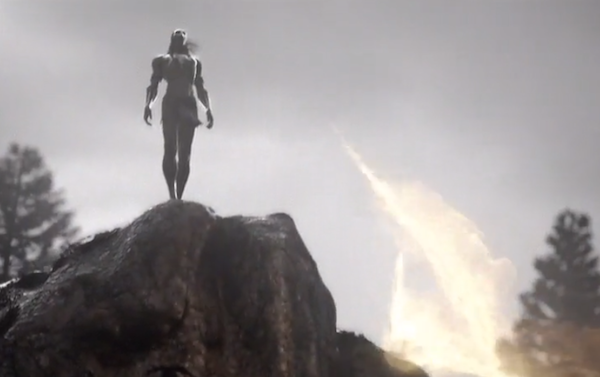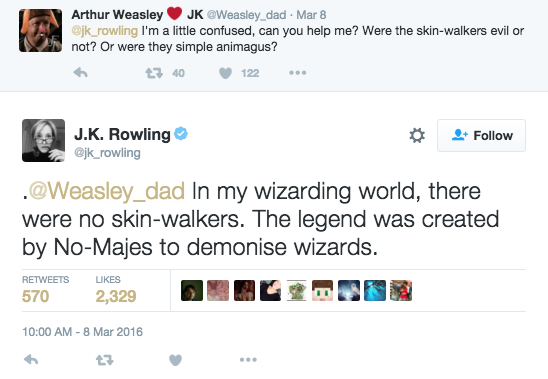TRENDING
In the News
Not everyone is loving J.K. Rowling's new stories

On Monday, J.K. Rowling announced that she was further expanding her world of witchcraft and wizardry with a new series of short stories focusing on the history of magic in North America—and we were beyond eager to get even more info on the Harry Potter universe. Once the stories started to drop, though, not everyone was thrilled.
With the announcement came the release of a trailer that included references to Native American legends about Skin-walkers, aka people who can turn into animals. Skin-walkers were further explained within the first Magic in North America story which detailed American magic history from the 14th century to the 17th century. The problem is that a lot of people are uncomfortable with the inclusion of Skin-walkers in J.K.'s magical world at all.
The frustration comes because Native American and indigenous people don't have a lot of representation in the media that we see, wehther that's movies, TV shows or books. On top of that, the characters and stories we do get are often dishonest to their real cultures—ones that are still alive today. Including real life Native American history in a mythical, magical story paints these (vast and varied) cultures as mythical and magical—and homogenous.
"The problem... is that we as Indigenous peoples are constantly situated as fantasy creatures," wrote Dr. Adrienne Keene an an open letter to the HP author. "Think about Grandmother Willow in Pocahontas, or Tonto talking to his bird and horse in The Lone Ranger, or the wolfpack in Twilight…or any other number of examples...But we’re not magical creatures, we’re contemporary peoples who are still here, and still practice our spiritual traditions, traditions that are not akin to a completely imaginary wizarding world (as [cool] as that wizarding world is)."

"What you do need to know is that the belief of [Skin-walkers] has a deep and powerful place in Navajo understandings of the world. It is connected to many other concepts and many other ceremonial understandings and lifeways. It is not just a scary story, or something to tell kids to get them to behave, it’s much deeper than that," continues Dr. Keene in a follow-up essay. "Rowling is completely re-writing these traditions... [Skin-walkers] are not 'misunderstood wizards.' Not by any stretch of the imagination."
While we understand that J.K. is doing her best to include diverse American histories in her wizarding world—and we appreciate the attempt—we get why this is a problem. By tying the history of Skin-walkers into her stories, J.K. is not only using one Native American culture and belief set as representative of many, she's also erasing some of their very real history in favor of her own fictional interpretation.

Like Dr. Keene says, representation is important. And when there's very little representation of a certain culture, every character, every story matters. We love Rowling and her writing (and so does Keene!), but we're not sure she hit the nail on the head this time.
What do you think about Rowling's use of Skin-walkers in her story? Check out the conversation on Twitter here in the #MagicInNorthAmerica hashtag.
Photo credit: Entertainment Weekly
POSTED IN In the News, J.K. Rowling
check these out!
you might like these
-
 Check out the new February/March issue of Girls' Life starring Pressley Hosbach!
Check out the new February/March issue of Girls' Life starring Pressley Hosbach!
-
 Triple Charm just dropped their newest EP, Undercover in Love (and we're adding it our V Day playlists rn)
Triple Charm just dropped their newest EP, Undercover in Love (and we're adding it our V Day playlists rn)
-
 EXCLUSIVE! Star Wars: Skeleton Crew star Kyriana Kratter is out of this galaxy
EXCLUSIVE! Star Wars: Skeleton Crew star Kyriana Kratter is out of this galaxy
-
 EXCLUSIVE! Dai Time is changing the game for Gen Z
EXCLUSIVE! Dai Time is changing the game for Gen Z

 become a contributor
become a contributor


















